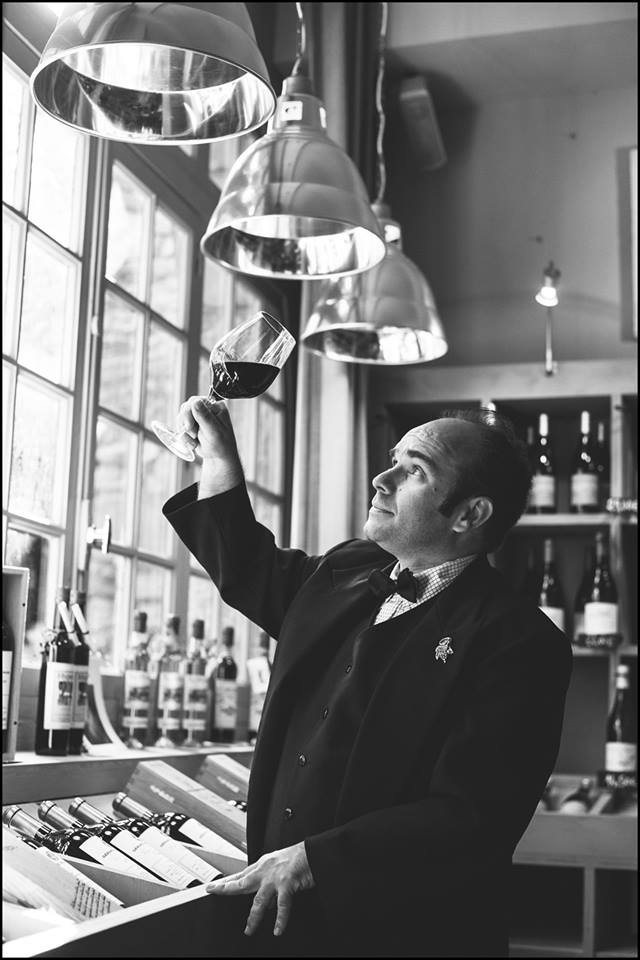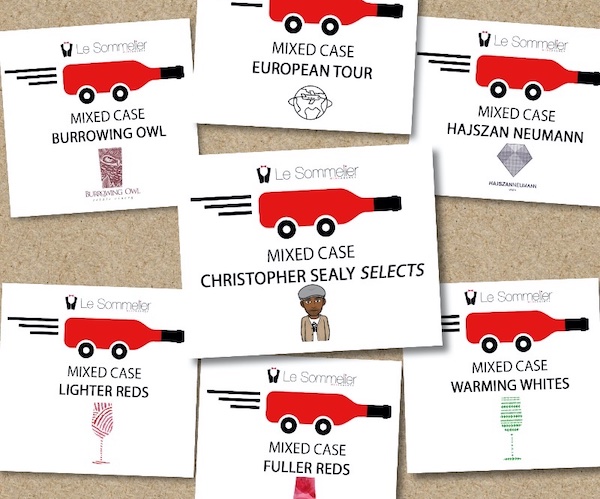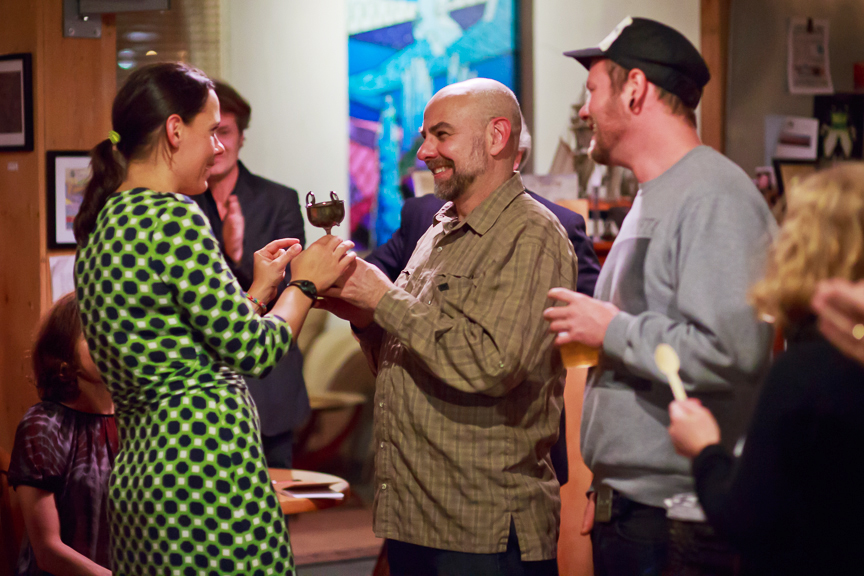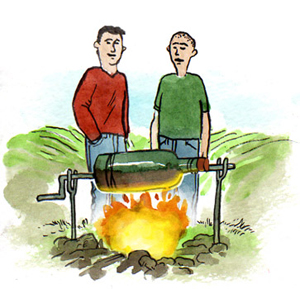
Sommelier Olivier Zavattin carefully vetting the wines for the third visit to Carcassonne of Lord Sabre AKA DJ Andrew Weatherall – All Rights Reserved © Ludo Charles
It’s not like your common-or-garden DJ to host a two day, late-summer micro-festival located in a fairytale castle in Carcasssonne, southwestern France with a Michelin-starred Chef in charge of the food, and a much-lauded local Sommelier/Bon-vivant presenting the local wines… but then Andrew Weatherall is anything but your common-or-garden DJ.
From his early stints with the notorious Boy’s Own collective in the late 80’s/early 90’s, through his Sabres of Paradise/Two Lone Swordsmen/Asphodells “gangs”, to his current fecund and most fruitful production/remix schedule, Weatherall has been forever the renegade, “The Outsider”, a defiant stance epitomised through his Music’s Not For Everyone radio show sets.
Seeing as Good Food Revolution will be in attendance at this week’s Convenanza Festival, we thought it only right to conduct an in-depth interview with Olivier Zavattin, the gregarious and passionate Languedoc Sommelier responsible for selecting the wines for the couple of hundred Weatherall acolytes descending upon Carcassonne for a weekend of esoteric, pulsating, shimmering rythyms, stellar food, and delicious vinous indulgence.
Good Food Revolution: So Olivier, please tell our readers about what you are currently doing in the southwest of France?
Olivier Zavattin: Hello, my name is OIivier Zavattin, I’m 40 years old and after a career in Michelin starred restaurants and several important competitions that placed me amongst the top-rated French sommeliers of my generation, I wanted to slow down my way of life by buying a wine shop in Carcasonne, and it is called La Passion du Vin.
I wanted to share my knowledge to help restaurants that don’t have a Sommelier to have good wine lists.
I also consult with some larger châteaux to put in place wine tourism, like the Andrew Weatherall Festival, as well as Gérard Bertrand’s “Festival de l’Hospitality.”
GFR: So in your wine store, La Passion du Vin, please tell us about your philosophy when it comes to the wines that you choose to carry?
OZ: My philosophy is simple. Through my many vineyard visits, I have to find wines for my clients that are on the cusp of what is new. At home, I drink quite often “natural wines” that are made without sulphur, and we sell a few of them at my shop. For me, wine is all about love and sharing.
GFR: Were you always interested in wine? When did you decide to make wine your career?
OZ: I grew up in a village in the south of France, where all of my friends had Vignerons as parents. When I returned to hospitality school, after a stage at a Michelin starred restaurant, I discovered the career of Sommelier. Since that day, I knew that my career would be that of a Sommelier! It was there, where I met the French Sommelier elite, and the competitions started… 20 years of passion and it’s not finished!
GFR: When it comes to the wines of the Languedoc, which particular appellations are exciting you these days?
OZ: Today, the wines of the Languedoc region are very popular. It is a fabulous and complex terroir, one of the largest viticultural regions of the world, with all styles of wine: Crémant de Limoux, the whites of Picpoul, Boutenac, the terrasses of Larzac and the famous sweet wines named Vins Doux Naturels (VDN), and the wines of the Templars.
GFR: And when it comes to producers, who do you feel is doing something truly extraordinary?
OZ: As for the extraordinary producers of the Languedoc, they are Borie de Maurel, Gauby, Gérard Bertrand, Marlène Soria (Clos Syrah Léone), Rémy Pedreno, Marjorie Gallet (Roc des Anges), Olivier Jullien, as well as the natural vintners quite popular on social media like Jeff Coutelou, Domaine Léonine, Vincent Bonnal…. there are so many…
GFR: We don’t see too much Languedoc white in our market. What do you feel Languedoc does well when it comes to white wines?
OZ: To produce quality whites in Languedoc, sites need to be of high altitude and/or sanitarily clean. In my opinion, quality white wines of the South of France are Limoux (south of Carcassonne), magnificent Chardonnay and Chenin Blanc are produced by vintners like Gilles Azam, Franck Schisano and Cave Anne de Joyeuse (La Butinière). The region of Picpoul de Pinet produces a white wine ideal with oysters and other seafood, as it lies on the Étang de Thau, the largest of a string of lagoons south of Montpellier.
GFR: For you, what is THE red grape of the Languedoc? And why?
OZ: I adore Carignan, because it one of the emblematic varieties of the region. Once critized, it was torn out, but today, we realized that it is super, so the vintners replanted. The only issue however, is that the vines needs to be at least 40 years old in order for the wine to produce a magical wine.
GFR: I still feel that the Languedoc is a vast, for-the-most-part untapped treasure trove of amazing wines. Why don’t you think that Languedoc doesn’t yet have the same recognition and/or prestige of so many other French regions?
OZ: The reason is simple; we have, for too long been, producing blends and negociant wines. We didn’t start bottling until the end of the 60s, the best varietals didn’t start arriving until the 70s, like Syrah for example. The majority of independent vintners didn’t start to assert themselves until the end of the 80s. The paradox here is that the Romans planted grapes in this region over 2000 years ago, but the story of our vineyards, in the contemporary sense, started only 30 years ago.
GFR: During my recent travels down there, although I tasted many superb wines, I was still quite shocked at how many wines I tasted had serious issues with brettanomyces. I was then further shocked when a few producers insisted that this full on funkiness was la garrigue or le terroir, when it was quite obviously some seriously bad hygiene in the winery.
Whilst I do have a fair amount of tolerance for brett, especially when it is in balance with the rest of the wine, in a number of bottling this was the prevailing character. I’d love to hear your thoughts on this topic?
OZ: To my despair, Brett has become a bit fashionable in the region, especially with natural wines, without sulfur. It is a fault and a lack of hygiene; we now need to educate the new wave of naturalists! That said, in general, our vintners work well and all in all, we find less of this problem.
GFR: And on the flip side of that, I discovered a number of much more modern, international styles that had been hit with so much new oak that they were just too much. Does anyone in France actually drink this stuff or do they just slap a hefty price tag on it and ship it off to North America?
OZ: There was the “oaky trend,” the trend where the wines tasted too oaky, but today most of the vintners of the Languedoc who sell to the domestic market calmed down.
For the international market however, we do still find too many oaky wines. I like your question because we have found that tastes change and often improve the quality of the juice, and not the vinification techniques which often mask the true work of the vintner.
GFR: Carignan is a grape that I have always had a serious soft spot for. I’m really happy to see a few producers really focusing upon making quality Carignan, and I tasted some wonderful, wonderful examples. How do you feel about this much overlooked varietal?
OZ: Wow! Great question, it’s my favourite varietal. Please see above for my answer. Don’t forget #carignanday on June 8!
GFR: It’s a lot easier to practice biodynamic viticulture down here in the southwest than it is in many other regions of France (due to the absence of much of the disease pressure that impacts, say, Burgundy). How do you feel about the biodynamic culture in your part of the world and the wines they produce?
OZ: I am absolutely for biodynamics, it’s the real deal. I discovered this culture thanks to Nicolas Joly in the Loire Valley, with his famous Coulée de Serrant in Savenières. I am persuaded that this culture is the future, in the hope to preserve our ecosystem.
GFR: Vin Nature (Natural Wine) is still a huge thing in North America. I’d be interested to hear your take on such ventures in the Languedoc?
OZ: I am totally in favour, and I only drink natural wine at home, however, today many customers are cautious with this type of wine because often one can find elements that one finds distasteful.
In the Languedoc, as in other regions we have excellent natural winemakers who do a good job, however, the the role of alternative wine shops is important, we must educate customers, explaining that it takes a carafe to aerate wine correctly, to serve wines cooler, to have a little patience before tasting … “Education”!
GFR: So you are responsible for the wine portion of the Andrew Weatherall Festival in Carcassonne this September… how did you become involved in that? It’s a dream come true for me… Weatherall + Wine + Food + A beautiful castle as a venue = An extremely happy Jamie Drummond.
OZ: Bernie and Benjamin are friends, we share the same musical philosophy for many years as we are from this “electro” generation, we frequent the same spots… This Festival Research Excellence, quality around the Music, spot of tourism, our values and the essence of our culture, history, gastronomy and wine… Since I’m striving for excellence every day for the sommelier, our collaboration was a natural thing…
GFR: And what can festival goers expect by way of wine offerings at the castle?
OZ: Last year we gave the selection a “French Touch” with an array of local varietal wines, this year we are still in “selections and tastings” mode but we are leaning towards stylish wines with lots of freshness and some “fun” stuff from the terroir of Limoux… Stay tuned!
GFR: Speaking of music, what are your thoughts on pairing wines with music?… how do you feel about music in restaurants?
OZ: Music and wine work… and the program of the Convenanza Andrew Weatherall Festival, is in full symphony with my selection of wine… I also often combine much Jazz with wine. Restaurants should better choosing music programming… especially in France!
GFR: I’m still not convinced about the Jazz/wine thing myself. One of my bugbears actually. Way too much dodgy Jazz in restaurants for my liking. However, I digress…
The food at this festival sounds pretty special too. It’s quite a well-known Chef who is providing the catering, is it not?
OZ: Jérôme Ryon is an excellent Chef… discreet, as he respects the products and reflects a French cuisine through fashionable dishes, loving the excercise in synergies between the dishes and the wines… there is a natural fit between the work of this Chef and this festival.
GFR: What kind of dishes are truly typical for the region?
OZ: We are a region of “Land and Sea”, regional cuisine is really wide depending on whether one is near the sea or inland …
In Carcassonne, we are in the cassoulet country… A magical food, a friendly dish that represents the sense of sharing.
GFR: And would you please give us your very favourite regional food and wine pairing?
OZ: With our Cassoulet, I recommend a Minervois, Corbieres, or Fitou. Oysters of Bouzigues with a Picpoul de Pinet, with our asparagus (seasonal) dry muscat with a bowl of Lisette (mackerel) a Clape White. A boar stew with Cabardès. A loup à l’étuvée (local sea bass) with leeks braised with Chardonnay de Limoux.
GFR: Where are your favourite places to dine in Carcassonne, for both casual and fine dining? I believe that you have some rather good restaurants?
OZ: In the city :
La Barbacane – Chef Jérôme Ryon – * Michelin
Le Comte Roger – Chef Pierre Mesa –
L’Escargot – Tapas originaux – A very trendy place
Le Créneau – Excellente Côte de Bœuf – Branch
En Ville :
Un Jardin En Ville, Chez Alban, A concept Restaurant that is nice and warm
Le Parc – Chef Franck Putelat – ** Michelin
Bistrot de Tantine – Produit Frais – A lovely setting
Chai Moi – Bar à Vins, nicely relaxing on the bank of the Midi canal
Chez Norbert – Le Paradis de la Viande – for a very French ambience
GFR: And what do you see as being the future for Languedoc wines?
OZ: Le Languedoc c’est l’Avenir, j’en suis persuadé, les vins ont beaucoup de succés, nous sommes en train d’écrire et de vous raconter cette histoire…
The Languedoc is the future, I am sure, the wines will have a lot of success, we are currently writing the story of these wines and will see what happens …
GFR: Olivier, we thank you so much for your time, and look forward to seeing you on the dance floor in the castle later this week!
OZ: Un grand plaisir de répondre à vos questions et de partager ma passion pour les vins de notre région… Love & Share…
It has been a great pleasure to answer your questions and share my passion for the wines of our region … Love & Share …

Edinburgh-born/Toronto-based Sommelier, consultant, writer, judge, and educator Jamie Drummond is the Director of Programs/Editor of Good Food Revolution… And he is so ever grateful to Bernard Stramwasser of Le Sommelier for assisting with the translation of this lengthy interview.








Thanks ! Very Nice Blog 😉